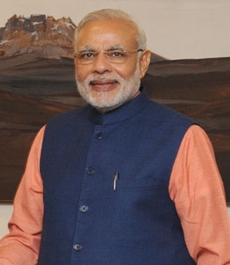PM Modi calls for `long jump' to socio-economic transformation by 2022
17 Apr 2017
Prime Minister Narendra Modi has called for a "long jump" towards achieving a major socio-economic transformation for building a new India by 2022, in what he insisted as the major national discourse since Gandhiji led India towards independence.
 In his address to the party's national executive in Bhubaneswar, the capital of Odisha, Prime Minister Modi reaffirmed his commitment to development and stressed on 'P2 G2' (pro-people proactive good governance) agenda for the BJP and its governments.
In his address to the party's national executive in Bhubaneswar, the capital of Odisha, Prime Minister Modi reaffirmed his commitment to development and stressed on 'P2 G2' (pro-people proactive good governance) agenda for the BJP and its governments.
"Our aim should not be change of government but transformation of society," the prime minister said. He also rejected the EVM row as another "unsustainable" product of "manufacturing factories" of opposition parties.
In what is reminiscent of Mao Zedong's 'Great Leap Fowrard" Modi called for making India a happy and prosperous nation and a leading country in the world by 2022 for which the pace of progress needed to be quickened. "It's time for taking a long jump towards building a new India and rewrite history. We have done a lot of work but it is not adequate. We have to awaken our 'purusharth' (efforts) and work in mission mode," he said.
The country will be celebrating 75 years of Independence in 2022.
We have to build a new India of social and economic equality by keeping the poor at the centre of government's policies, he said.
Putting the poor and the dispossessed at the centre of his policy narrative, Modi said, India is a rich country with poor people, and blamed corruption and "vision-less governments" of the past for its current condition.
"Jan dhan, van dhan, jal dhan' (human, forests and water resources) will be the foundation of a new India," he said, underlining his agenda of tapping India's demographic dividend, launching sustainable development in forests for tribals and exploiting its water resources.
Modi said he wants the poor and the under-privileged to be the focus of all his government policies. "As a road map the Prime Minister has coined the P2 G2 (Pro-Poor, Proactive and Good Governance) approach," senior BJP leader and union transport minister Nitin Gadkhari told reporters in Bhubaneswar.
At policy level, the Modi government will continue to focus on "Jan Dhan" or financial inclusion of the poor. And, it includes two new aspects…"Jal Dhan" programmes to increase of agriculture network, and "Van Dhan" programmes to save forest resources.
"These will help Gaon, Gareeb, Mazdoor and Kisaan (villages, the poor, the marginalized and farmers)," Gadkari told reporters.
As shift in focus to the "poor", "downtrodden" and "deprived" - traditionally identified as the trademark political rhetoric used by the Congress and the Left - is a singular shift to BJP's industry-oriented development plans.
"The poor who earlier voted for the Congress now are voting for the BJP," human resources development minister Prakash Javdekar told reporters earlier.
In a move towards mainstreaming the party, the BJP national executive also adopted a resolution to make the National Commission for Backward Communities a statutory body.
A bill to this effect has been cleared by the lower house of the Parliament, the Lok Sabha, where the BJP enjoys a majority. It is, however, still being considered in the Rajya Sabha where the BJP doesn't have a majority.
Modi is banking on the consolidation of other backwards castes (OBCs) in the recently concluded Uttar Pradesh assembly elections that led the BJP to a resounding victory for further consolidation of votes.
The BJP bagged 325 out of the 425 seats in UP assembly on the back of a consolidation of OBC votes. BJP is now looking at securing OBC backing across the country.



















